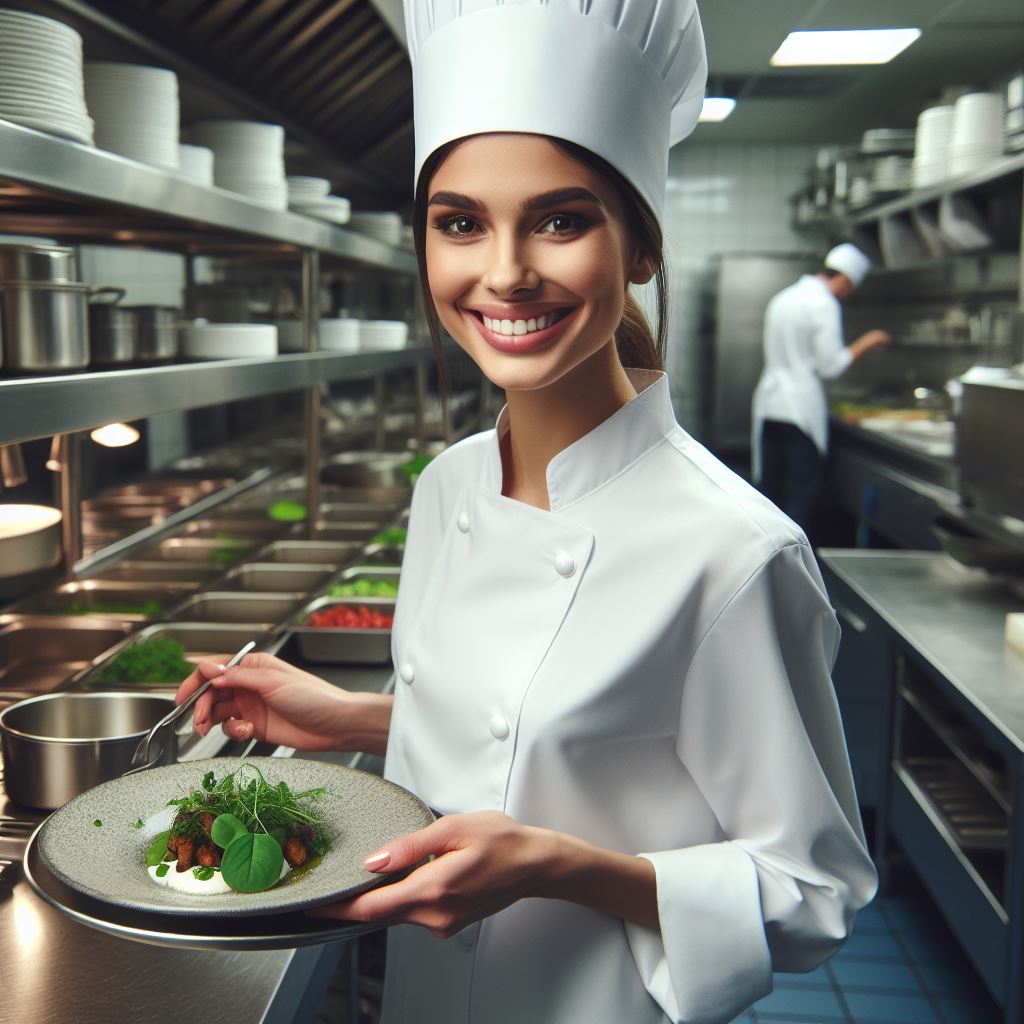Introduction
The UK culinary scene is renowned for its vibrant and dynamic food culture.
From traditional English pubs to Michelin-starred restaurants, the country offers a wide range of culinary experiences.
This scene has continued to evolve and adapt over the years, reflecting the changing tastes and preferences of its diverse population.
One important aspect of this evolution is the rise of female chefs in the UK culinary industry.
It is crucial to discuss and acknowledge their achievements and the challenges they face.
Historically, the culinary world has been dominated by male chefs, but this is gradually changing as more women step into leadership roles in kitchens across the country.
By highlighting the rise of female chefs, we recognize their significant contributions to the UK culinary scene.
These women bring new perspectives, creativity, and skills to the industry, enriching the culinary landscape.
Additionally, discussing their journey helps draw attention to the barriers and biases they encounter and creates space for dialogue on gender equality in the culinary world.
This section explores the rise of female chefs in the UK scene, highlighting their successes and shedding light on the gender disparities that still exist.
By understanding their experiences, we can support and empower aspiring female chefs and promote a more inclusive and diverse culinary environment.
The time has come to celebrate the achievements of female chefs and work towards a more equal culinary landscape in the UK.
Historical Context
Traditional gender roles in the culinary industry
- For decades, the culinary industry in the UK has been dominated by male chefs.
- Women were mostly limited to domestic kitchens and were not considered professional chefs.
- Stereotypes and societal norms portrayed cooking as a feminine activity while professional kitchens were seen as male spaces.
- Traditional gender roles confined women to the roles of home cooks and not culinary leaders.
Discrimination and challenges faced by female chefs in the past
- Female chefs have historically faced discrimination and bias in professional kitchens.
- They encountered challenges such as unequal pay, limited job opportunities, and lack of support.
- Misogynistic attitudes prevailed, with women often being dismissed as lacking the strength and skill required in professional kitchens.
- Due to the prevailing male-dominated culture, some women chefs had to endure harassment and sexism.
- The scarcity of female role models made it difficult for aspiring female chefs to envision a successful culinary career.
In the past, female chefs in the UK had to overcome traditional gender roles and face daunting challenges arising from discrimination within the culinary industry.
However, their perseverance and talent paved the way for significant changes in the present day.
Read: Top UK Chef Schools: What You Need to Know
Personalized UK Career Consulting
Receive tailored career guidance designed just for you. Get actionable steps and expert support to boost your career in 1-3 days. Take control of your career now.
Get StartedFactors Contributing to the Rise of Female Chefs in the UK
Changing societal attitudes towards gender roles
- Society’s perception of gender roles in the culinary industry has evolved significantly.
- Traditional expectations of women being limited to cooking at home are slowly disappearing.
- The acceptance and recognition of women as professional chefs have been growing.
- Increased gender equality awareness has led to more opportunities for female chefs.
Collaboration and support among female chefs
- Female chefs have formed a strong network to support and empower each other.
- Collaborative efforts have provided a platform for female chefs to share experiences and knowledge.
- Mentoring programs have been established to guide aspiring female chefs in their career paths.
- Female chefs have joined forces to create events and initiatives that promote their visibility and success.
Efforts by culinary schools and institutions to promote gender equality
- Culinary schools have recognized the importance of gender diversity in their programs.
- Equal opportunities for enrollment and scholarships have been provided to aspiring female chef.
- Institutions have implemented policies to ensure equal treatment and support for all students.
- Workshops and seminars on gender equality have been incorporated into culinary education.
Rise of prominent female chef role models
- The emergence of successful female chef as role models has inspired aspiring women in the industry.
- Celebrity chefs like Nigella Lawson and Mary Berry have played a crucial role in breaking gender barriers.
- Female chefs who have achieved Michelin stars or other prestigious awards have become beacons of success.
- The achievements and accomplishments of these role models have motivated more women to pursue careers in the culinary field.
In short, the ascent of UK’s female chef stems from evolving gender role attitudes, collaboration among women in the culinary field, support networks, initiatives by culinary schools promoting gender equality, and influential female chef role models..
These factors have combined to create a more inclusive and diverse culinary industry, opening doors for women to excel and make their mark as professional chefs.
The continued progress in these areas will ensure that the rise of female chef in the UK scene is a sustainable and lasting phenomenon.
Read: Essential Skills Every UK Chef Must Master

Success Stories and Influential Female Chefs in the UK
Notable female chefs who have made a significant impact
- Clare Smyth: The first female chef to run a three-Michelin-starred restaurant in the UK.
- Angela Hartnett: Has a Michelin star and a successful chain of restaurants in London.
- Skye Gyngell: Known for her emphasis on seasonal ingredients and sustainable cooking.
- Hélène Darroze: A renowned chef with three Michelin stars, known for her French cuisine.
Examples of award-winning female chefs and their achievements
- Clare Smyth: Won the World’s Best Female Chef award by The World’s 50 Best Restaurants in 2018.
- Hélène Darroze: Received the Veuve Clicquot World’s Best Female Chef award in 2015.
- Angela Hartnett: Was awarded an MBE for her services to the hospitality industry in 2007.
Recognition of female chefs in popular media
- Nigella Lawson: A popular TV chef, cookbook author, and presenter of numerous cooking shows.
- Mary Berry: Hosted The Great British Bake Off and has written more than 75 cookbooks.
- Rachel Khoo: Known for her TV show “The Little Paris Kitchen” and cookbook of the same name.
- Angela Hartnett: Frequently appears as a judge on MasterChef: The Professionals in the UK.
- Sabrina Ghayour: A best-selling author and presenter known for her Middle Eastern-inspired cuisine.
These incredible female chef have not only proven their culinary skills but have also become influential figures in the industry.
By breaking barriers and challenging stereotypes, they have paved the way for aspiring female chefs in the UK.
Their talent, hard work, and dedication have earned them recognition and awards, inspiring other women to pursue their dreams in the culinary world.
Read: Day in the Life of a UK Michelin Star Chef
Promoting Diversity and Equality in the Culinary World
Importance of diversity in the industry
- Diversity in the culinary industry brings unique perspectives, ideas, and flavors.
- Embracing diversity allows for a more inclusive and representative culinary scene.
- Different cultural backgrounds contribute to a more dynamic and exciting dining experience.
Initiatives and organizations supporting female chefs
- Women in the Food Industry (WIFI) provides mentorship and networking opportunities for female chef.
- The Culinary Trust aims to support women by providing grants and scholarships.
- Chefs with Issues promotes gender equality and addresses challenges faced by female chef.
Strategies to encourage aspiring female chefs to enter the profession
- Schools and culinary programs should actively encourage and promote gender diversity.
- Mentorship programs can provide guidance and support for aspiring female chef.
- Highlighting success stories of female chefs can inspire and motivate future generations.
Overcoming barriers and forging a path of success for future generations
- Gradually breaking down gender stereotypes and biases in the culinary industry.
- Encouraging more female representation in leadership positions and award ceremonies.
- Workplace policies that promote work-life balance and support female chefs with families.
- Providing access to financial resources and funding for female-owned culinary businesses.
- Creating a supportive community that celebrates and uplifts female chefs.
Promoting diversity and equality in the culinary world is of utmost importance.
Embracing different perspectives and backgrounds brings innovation to the industry, ensuring a vibrant dining experience.
Initiatives and organizations that support female chef play a crucial role in encouraging and empowering women to pursue culinary careers.
Strategies such as mentorship programs and highlighting success stories can inspire aspiring female chefs.
Overcoming barriers and creating a path of success for future generations involves breaking down gender stereotypes, providing support systems, and promoting equal opportunities.
By actively promoting diversity and equality, the culinary world can continue to evolve and thrive.
Your Dream Job Starts with a Perfect CV
Get a tailored CV and cover letter that captures your unique strengths and stands out in your industry. Let us help you make an unforgettable first impression.
Get StartedRead: Mastering Travel Logistics: A UK Guide
Delve into the Subject: Digital Tools for UK Event Planners
Conclusion
The UK culinary scene has witnessed a significant rise in the number of female chef, breaking traditional gender barriers and redefining the industry’s landscape.
Women have made remarkable strides, challenging stereotypes and proving their skills as exceptional chefs.
The contributions of female chef have been invaluable, injecting fresh perspectives, creativity, and talent into the culinary world.
Their unique approaches to food have brought about innovative dishes, flavors, and techniques, enriching the dining experience for all.
As we reflect on the rise of female chef in the UK culinary scene, it is crucial to continue supporting and recognizing their accomplishments.
By actively promoting diversity and inclusivity, both in professional kitchens and at home, we can help create an environment where all chefs, regardless of gender, thrive.
Let us celebrate the achievements of female chef and embrace their contributions fully.
Respecting their skills, expertise, and dedication will only lead to a more dynamic and progressive culinary industry.
Together, we can shape a future where female chefs receive the recognition they deserve, allowing their talent and passion to shine.
[E-Book for Sale]
500 Cutting-Edge Tech Startup Ideas for 2024 & 2025: Innovate, Create, Dominate
$19.99 • 500 Tech Startup Ideas • 62 pages
You will get inspired with 500 innovative tech startup ideas for 2024 and 2025, complete with concise descriptions to help you kickstart your entrepreneurial journey in AI, Blockchain, IoT, Fintech, and AR/VR.




